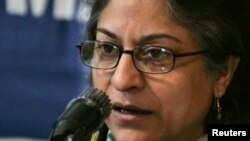Different people called her different things: a fighter who spoke truth to power, a traitor, a champion of human rights, anti-Pakistan, a national icon, anti-Islam, a voice for the voice-less.
Asma Jahangir, the first and so far the only female president of Pakistan’s Supreme Court Bar Association and a leading human rights attorney, died due to a cardiac arrest at the age of 66 Sunday in Lahore.
A fiery critic of the military in a country that has been under one dictatorship or another for almost half of its existence, Jahangir often found herself in trouble with the institution and its supporters.
In 1983, her pro-democracy struggle against dictator Zia ul Haq landed her in jail. Her time behind bars though, failed to curtail her passion for the rule of law and constitution, according to Pakistani lawyer and political analyst Babar Sattar who tweeted, “She stood tall among pigmies, spoke truth to intoxicated power & stood up to fight when she thought she was right.”
Her critics, though, accused her of being an agent of Pakistan’s rival India. Zaid Hamid, a controversial political commentator known to have a liking for conspiracy theories, compared her to a Pakistani politician who is accused of treachery and inciting violence.
Jahangir was one of the founders of the Human Rights Commission of Pakistan, a forum that went on to highlight rights violations across the country.
Comments on Twitter, like the one below from a person apparently belonging to Pakistan’s restive Balochistan province, where activists often complain of enforced disappearances and other rights violations, show how those in the country who felt oppressed viewed her.
"Asma Jahangir “YOU’RE MY PRIDE,” tweeted someone who went by the name Arya Stark Khan, with a profile picture of Arya Stark of the famous HBO series Game of Thrones.
Another tweet expressed how she was viewed as a safety blanket by many activists across the country.
Jahangir also served as United Nations Special Rapporteur on human rights. On its website, the international rights body praised her for her “contribution to the cause of human rights” for which she received multiple awards both nationally and internationally.
"We have lost a human rights giant," U.N. Secretary-General Antonio Guterres said in a statement about Jahangir. "She was a tireless advocate for inalienable rights of all people and for equality - whether in her capacity as a Pakistani lawyer in the domestic justice system, as a global civil society activist, or as a Special Rapporteur.” Guterres said Jahangir was "brilliant, deeply principled, courageous and kind."
As soon as the news of her death broke, #AsmaJahangir started trending on Twitter in Pakistan.
A female member of Pakistan’s National Assembly, Nafisa Shah, called her the “founder of Pakistan's homegrown human rights movement , a bold, fearless voice of the downtrodden &dispossessed.”
Maryam Nawaz Sharif, the daughter of Pakistan’s recently ousted prime minister Nawaz Sharif tweeted, “Democracy, human rights and resistance against oppression lost a great soldier- Asma Jehangir. It's everyone's loss. What a sad day!”
Pakistan’s former foreign minister, Hina Rabbani Khar, tweeted, “There’ s no one who can match her bravery and courage. Pakistan is poorer today.”
And Adil Najam, the Dean of the Pardee School of Global Studies at Boston University tweeted she “was not just the voice of our collective conscience. She was our conscience. Her spirit will live as long as that voice in our head keeps telling us what is not right, what must not be tolerated,why not to give in or give up.”
Several actors, writers, and poets from India’s famous film industry expressed grief over her death, calling it a loss for the entire region. She is survived by a son and two daughters.





